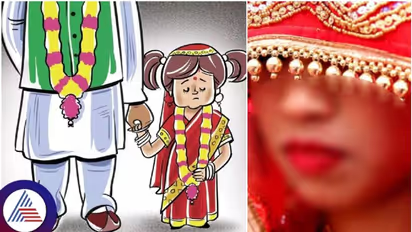Karnataka stands at no. 2 in child marriages across India

Synopsis
The Supreme Court heard alarming statistics on child marriages in India, with Tamil Nadu, Karnataka, West Bengal, Telangana, and Andhra Pradesh leading in reported cases. The Ministry of Women and Child Development disclosed figures during a petition, highlighting inadequate legal action despite efforts. The court reserved judgment on issuing guidelines to address this pressing social issue.
Shocking statistics have been revealed about the prevalence of child marriages across several states in India over the past three years. According to information presented by the Central Government to the Supreme Court on Wednesday, Tamil Nadu, Karnataka, West Bengal, Telangana, and Andhra Pradesh emerged as the top five states where child marriages have occurred in alarming numbers.
During the hearing of a petition filed by a voluntary organization urging the Supreme Court to issue guidelines to curb child marriages, Additional Solicitor General Aishwarya Bhati, representing the Ministry of Women and Child Development, disclosed concerning figures. She highlighted that Tamil Nadu recorded 8,966 child marriages, Karnataka 8,348, West Bengal 8,324, Telangana 4,440, and Andhra Pradesh 3,416 over the past three years.
To end child marriage, Assam govt approves stipend scheme for girl students; check details
Further statistics indicated 3,316 child marriages in Assam, 2,043 in Maharashtra, 1,206 in Gujarat, 1,197 in Uttar Pradesh, and 1,104 in Haryana, all ranking among the top 10 states grappling with this social issue, as per the Center's report.
Over 59,000 child marriages prevented in 2022-23, Bihar tops the list: Study
Despite efforts to prevent child marriages, Bhati acknowledged that significant numbers continue to occur, lamenting the low number of FIRs filed under the Prohibition of Child Marriage Act 2006. Responding to these findings, the NGO's lawyer criticized the inadequate legal action against those involved in child marriages and called for the appointment of dedicated officers to handle prevention efforts instead of current officials.
Following the arguments, the bench presided over by Chief Justice DY Chandrachud reserved judgment, expressing intent to deliberate on issuing directives and guidelines to bolster the efforts of both Central and State Governments in eradicating this societal menace.
Stay updated with the Breaking News Today and Latest News from across India and around the world. Get real-time updates, in-depth analysis, and comprehensive coverage of India News, World News, Indian Defence News, Kerala News, and Karnataka News. From politics to current affairs, follow every major story as it unfolds. Get real-time updates from IMD on major cities weather forecasts, including Rain alerts, Cyclone warnings, and temperature trends. Download the Asianet News Official App from the Android Play Store and iPhone App Store for accurate and timely news updates anytime, anywhere.